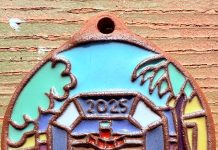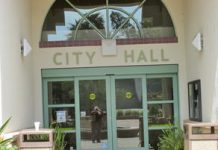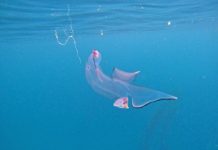Water, essential to all life on Earth, both literally and figuratively, is in short supply in the Southwestern United States, as well as dozens of other regions worldwide. Here on Catalina we are separated, some would say insulated, from things affecting the mainland, but in this particular case we are in lockstep with the Southwestern U.S. in regards to our increasing issues with fresh water resources.
Water, essential to all life on Earth, both literally and figuratively, is in short supply in the Southwestern United States, as well as dozens of other regions worldwide. Here on Catalina we are separated, some would say insulated, from things affecting the mainland, but in this particular case we are in lockstep with the Southwestern U.S. in regards to our increasing issues with fresh water resources.
Despite our recent rainstorms, there wasn’t sufficient precipitation to get us beyond the mandatory water restrictions and rationing programs set forth this year. Sadly, there isn’t any guaranteed end to be seen with these restrictions anywhere in the near future.
Spirited debates over what should have been done by any number of different Island entities does little to actually create solutions to our fresh water resources on Catalina island.
Knowing this, a small group of Avalon residents went to work on establishing a think-tank consortium who could research various fresh water resource management, conservation and production options and could then make recommendations to the city leadership as to what options might make the most sense for our community to pursue.
Traditionally the city has enlisted the help of consulting firms to conduct studies and to provide recommendations regarding various issues facing the island and Avalon.
While it can also be debated whether these consultants and suggestions have been worth it or not, it should be noted that the Island community holds within it a great number of very qualified and intelligent individuals. These people actually have a dog-in-the-hunt so to speak, and are quite capable of investigating possible solutions to meet our needs and are happy to do so free of charge to the community. The eventual payoff is an improved quality of island life for those who actually reside on Catalina, and that’s the motivation and difference behind the effort.
So beginning in July this past summer, an informal bi-monthly gathering of local citizens began discussions and research into what we are facing specifically with fresh water resources, what possible directions can be pursued to improve/increase/conserve those resources and what those options will cost, how the costs can be met, what will each system provide and what their projected contributions and limitations will be.
To date, the core group consists of current Avalon Mayor Anni Marshall, former Avalon Mayor Ralph Morrow, Darwin Horn, Kevin Strege, Gene Trapp, Avalon City public works manager Dennis Jaich, along with Rock Gosselin, Paul Demeyer, Tim Tyler, and myself.
In addition to the names listed above, we have also held meetings with members within the water treatment and reclamation industry, desalination industry, and several key figures throughout the state who are involved within Public Utilities circles.
The group has looked into more than a dozen various fresh water resource options and scenarios while reviewing several possible avenues of pursuit for Avalon. These options include things like additional storage capacity, holding tanks, new wells, desalination technologies, rainwater runoff capture systems and the group has come to the conclusion that the first most viable and necessary step that Avalon should consider is to concentrate our focus on the development of a wastewater reclamation program, and here’s why.
Avalon residents and visitors use roughly 400 acre feet of water annually.
The used water is a combination of both fresh water used in town and is derived via Southern California Edison from the alluvial wells connected to Thompson reservoir and saltwater via our saltwater toilet system.
Our used water is piped to the wastewater treatment facility near the Edison power plant and is processed to a degree where it is considered clean enough to pump out into the ocean along Pebbly Beach.
In essence, we throw away roughly 400 acre feet of water annually, a significant portion of which could instead be recycled and reused many times over for use in watering plants, rinsing off property and sidewalks, washing cars and flushing toilets.
The saltwater portion of Avalon’s fresh water management program originally was imagined to be a solution to reducing demands for fresh water so was therefore thought of as a stroke of genius when it was implemented decades ago.
Of course now that activity has revealed some very serious concerns in that the salt load has wreaked havoc with infrastructure in the form of damaging sewer systems and any related mechanical equipment and of course it has cut the life expectancy of the wastewater treatment facility’s equipment by half.
Replacing the saltwater with recycled fresh water can eliminate the cause of infrastructure damage by ridding saline in the system. By wonderful coincidence nearly every property in Avalon already has the delivery mechanism in place as the current saltwater supply piping can be easily converted over to handling recycled water instead.
By implementing a recycled water campaign in Avalon we could use fresh water for a multitude of daily uses which takes advantage of water that would otherwise be pumped out to sea. In doing so, our demands from our current reservoir can be drastically reduced as the only needs for that water will be for drinking, bathing, cooking and washing dishes and clothes. All other fresh water needs can be met with recycled water.
By reducing the demands on our reservoir we can extend its cyclical life between rainfall events which would allow for recharging the alluvial water tables beneath the reservoir and help get us beyond water rationing.
Additionally, the waste sludge produced in our current wastewater facility is high in salt content and requires burial in our landfill for disposal, by removing the saline the same sludge could instead be used as compost.
Naturally a project of this scale will require substantial investment and commitment from all involved. This includes local City, State and County Government, Southern California Edison, the Public Utilities Commission and of course local business leaders and residents.
Our small advisory group is just that, an advisory committee. We have no legal or formal connection to city Government. We are concerned citizens who want to help solve a long standing problem for Catalina Island. We looked at what options are available and recycled water rose to the surface of what makes the most sense. We opted to title the group R-TAP, the acronym for “Reclamation, The Avalon Project” and refers to our water taps. All island residents are encouraged to participate in R-TAP by attending meetings and assisting in moving us forward with wise and sensible fresh water resource management.
This is the first in a series of informational articles planned to keep island residents informed as to what R-TAP research has produced regarding possible solutions for fresh water resources for Catalina Island. For additional information regarding R-Tap and meeting schedules, please contact; rock@theavalonhotels.com.
Jon Council is a member of the R-TAP consortium.










